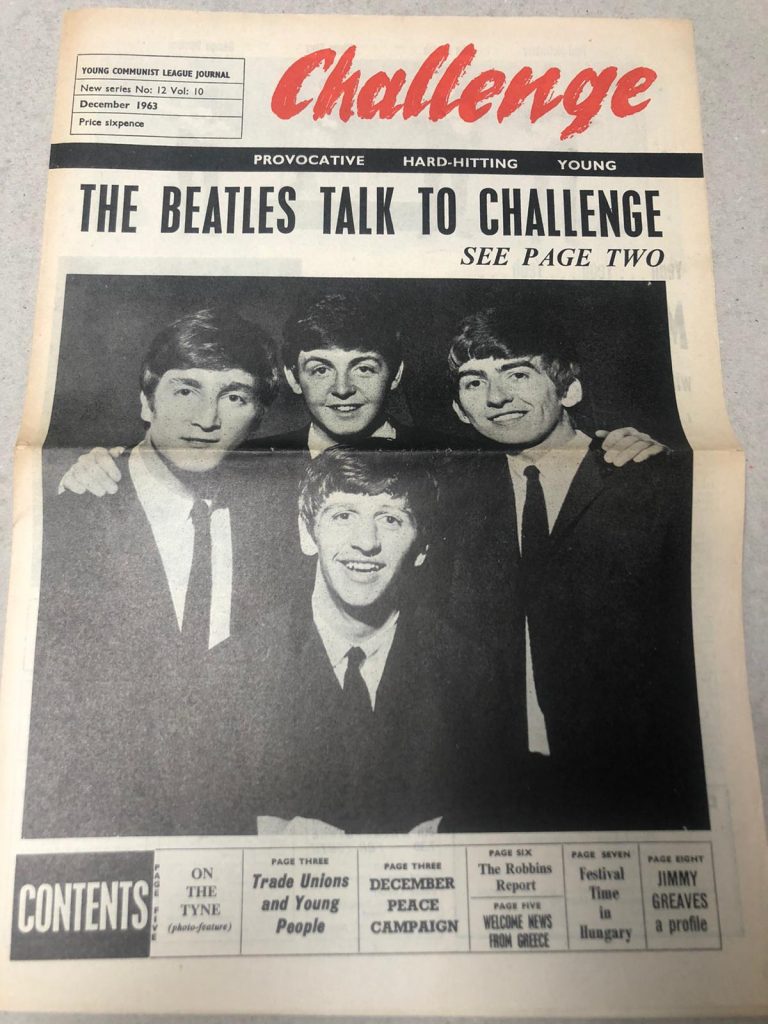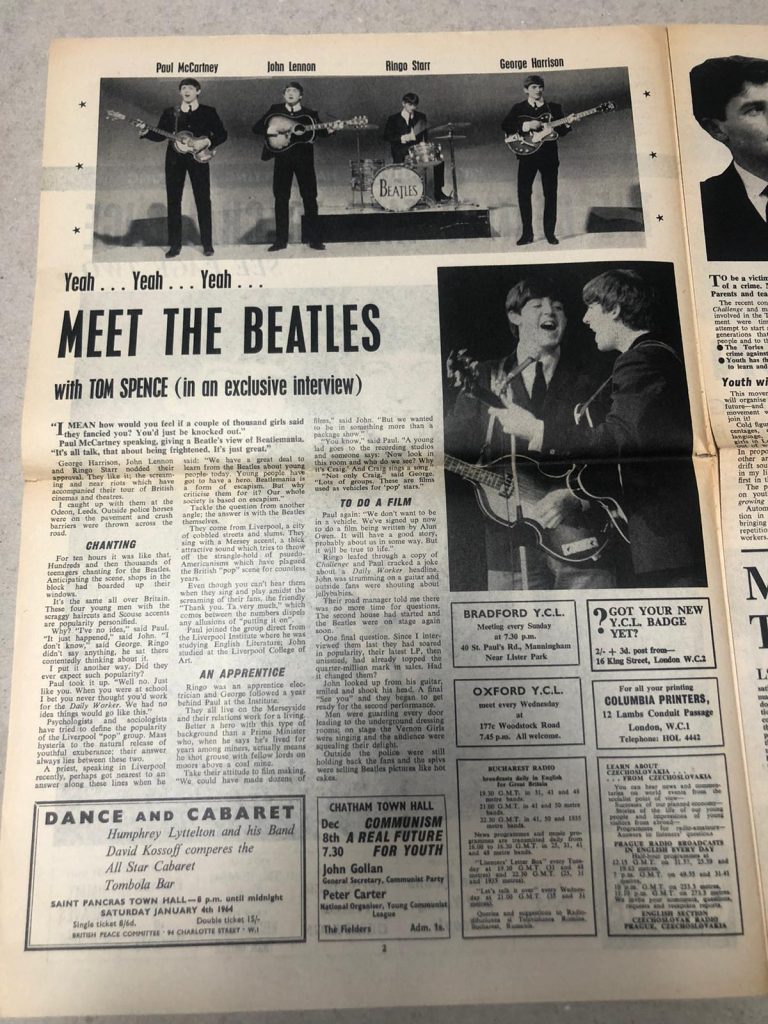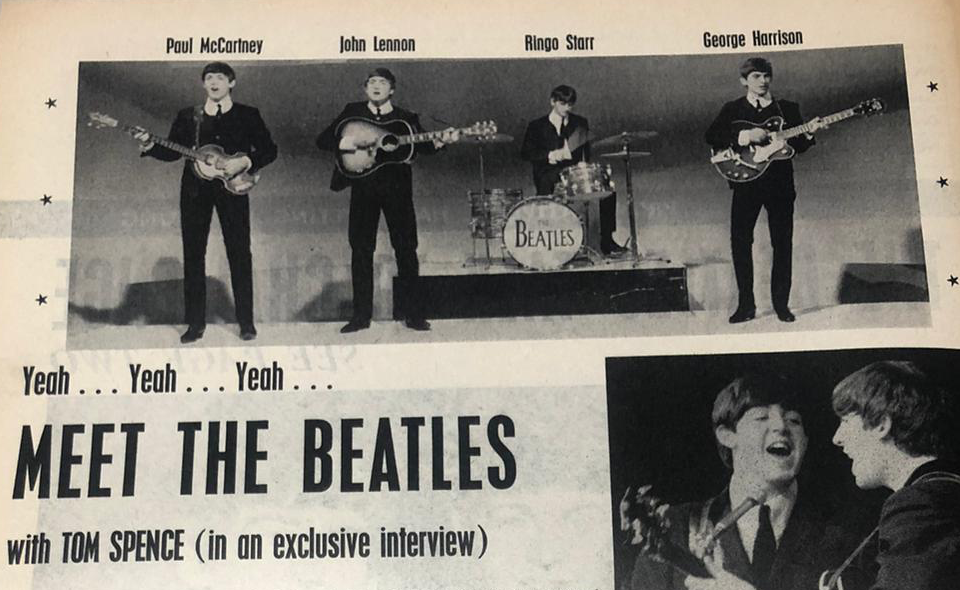“I mean how would you feel if a couple of thousand girls said they fancied you? You’d just be knocked out.” Paul McCartney speaking, giving a Beatle’s view of Beatlemania. ”It’s all talk, that about being frightened. It’s just great.” George Harrison, John Lennon and Ringo Starr nodded their approval. They like it; the screaming and near riots which have accompanied their tour of British cinemas and theatres. I caught up with them at the Odeon, Leeds. Outside police horses were on the pavement and crush barriers were thrown across the road.

Chanting
For 10 hours it was like that. Hundreds and then thousands of teenagers chanting for the Beatles. Anticipating the scene, shops in the block had boarded up their windows. It’s the same all over Britain. These four young men with the scraggy haircuts and Scouse accents are popularity personified.
Why? “I’ve no idea,” said Paul. “It just happened,” said John. “I don’t know,” said George. Ringo didn’t say anything, he sat there contentedly thinking about it. I put it another way. Did they ever expect such popularity? Paul took it up. “Well no. Just like you. When you were at school I bet you never thought you’d work for the Daily Worker. We had no idea things would go like this.”
Psychologists and sociologists have tried to define the popularity of the Liverpool “pop” group. Mass hysteria to the natural release of youthful exuberance: their answer always lies between these two. A priest, speaking in Liverpool recently, perhaps got nearest to an answer along these lines when he said: “We have a great deal to learn from the Beatles about young people today. Young people have got to have a hero. Beatlemania is a form of escapism. But why criticise them for it? Our whole society is based on escapism.”
Tackle the question from another angle; the answer is with the Beatles themselves. They come from Liverpool, a city of cobbled streets and slums. They sing with a Mersey accent, a thick attractive sound which tries to throw off the strangle-hold of pseudo-Americanisms which have plagues the British “pop” scene for countless years. Even though you can’t hear them when they sing and play amidst the screaming of their fans, the friendly “Thank you. Ta very much,” which comes between the numbers dispels any allusions of “Putting it on”. Paul joined the group direct from the Liverpool Institute where he was studying English Literature; John studies at the Liverpool College of Art.
An apprentice
Ringo was an apprentice electrician and George followed a year behind Paul at the Institute. They all live on the Merseyside and their relations work for a living. Better a hero with this type of background than a Prime Minister who, when he says he’s lived for years among miners, actually means he shot grouse with fellow lords on moors above a coal mine. Take their attitude to film making. “We could have made dozens of films,” said John. “But we wanted to be in something more than a package show.”
“You know,” said Paul. “A young lad goes to the recording studios and someone says: ‘Now look in this room and who do we see? Why it’s Craig.’ And Craig sings a song.”
“Not only Craig,” said George. “Lots of groups. These are films used as vehicles for ‘pop’ stars.”
To do a film
Paul again: “We don’t want to be in a vehicle. We’ve signed up now to do a film being written by Alun Owen. It will gave a good story, probably about us in some way. But it will be true to life.”
Ringo leafed through a copy of Challenge and Paul cracked a joke about a Daily Worker headline. John was strumming on a guitar and outside fans were shouting about jelly babies. Their road manager told me there was no more time for questions. The second house had started and the Beatles were on stage again soon.
One final question. Since I had interviewed them last they had soared in popularity, their latest LP, then unissued, had already topped the quarter-million mark in sales. Had it changed them?
John looked up from his guitar, smiled and shook his head. A final “See you” and they began to get ready for the second performance. Men were guarding every door leading to the underground dressing rooms’ on stage the Vernon Girls were singing and the audience were squealing their delight.
Outside the police were still holding back the fans and the spivs were selling Beatles pictures like hot cakes.
Tom Spence – December 1936




